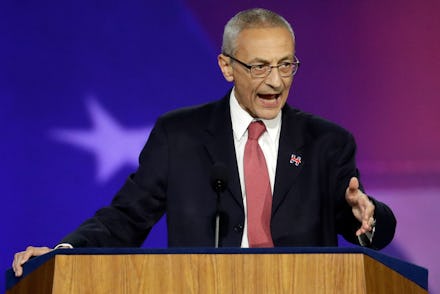Clinton campaign calls for Electoral College briefing on Russia's reported meddling

Hillary Clinton's campaign joined a group of members of the Electoral College in calling for electors to receive an intelligence briefing on Russia's reported meddling in the U.S. election, days after bombshell reports surfaced saying the hostile country's cyberattacks on the Clinton campaign were in an effort to help elect Donald Trump.
The call came from Clinton campaign chairman John Podesta, who said the issue of Russian interference in the election "did not receive the attention it deserved by the media" during the campaign.
"We believe that the administration owes it to the American people to explain what it knows regarding the extent and manner of Russia's interference and this be done as soon as possible," Podesta wrote in a statement.
After reports saying the CIA believes Russia meddled in the election to help elect Trump, a bipartisan group of members of Congress have come forward to call for a full investigation into Russia's potential role in the election.
The recent call for the investigation began with GOP Sens. John McCain and Lindsey Graham as well as Democratic Sens. Chuck Schumer and Jack Reed. It's now grown to include at least 15 Republican Senators, according to FiveThirtyEight's Nate Silver, including Senate Majority Leader Mitch McConnell.
Public outcry on Russia's reported involvement is also on the rise, including a Change.org petition calling for the Electoral College vote and inauguration to be postponed until a full investigation can be completed. More than 145,000 signed the petition as of Monday afternoon.
Still, it's unlikely the investigation will impact Trump's chances of being sworn in at the inauguration on Jan. 20.
The 538 electors of the Electoral College meet in just one week, on Dec. 19, to vote to certify the election results.
So far, only one Republican elector — Christopher Suprun of Texas — has publicly come forward to announce he will not vote for Trump. That's not remotely enough to deny Trump a win. Trump won 306 Electoral College votes based on the election results, far more than the 270 needed to secure victory.
Even if the Electoral College did reject Trump, the election would then be kicked to the House of Representatives, which has a Republican majority and is unlikely to select someone other than Trump.